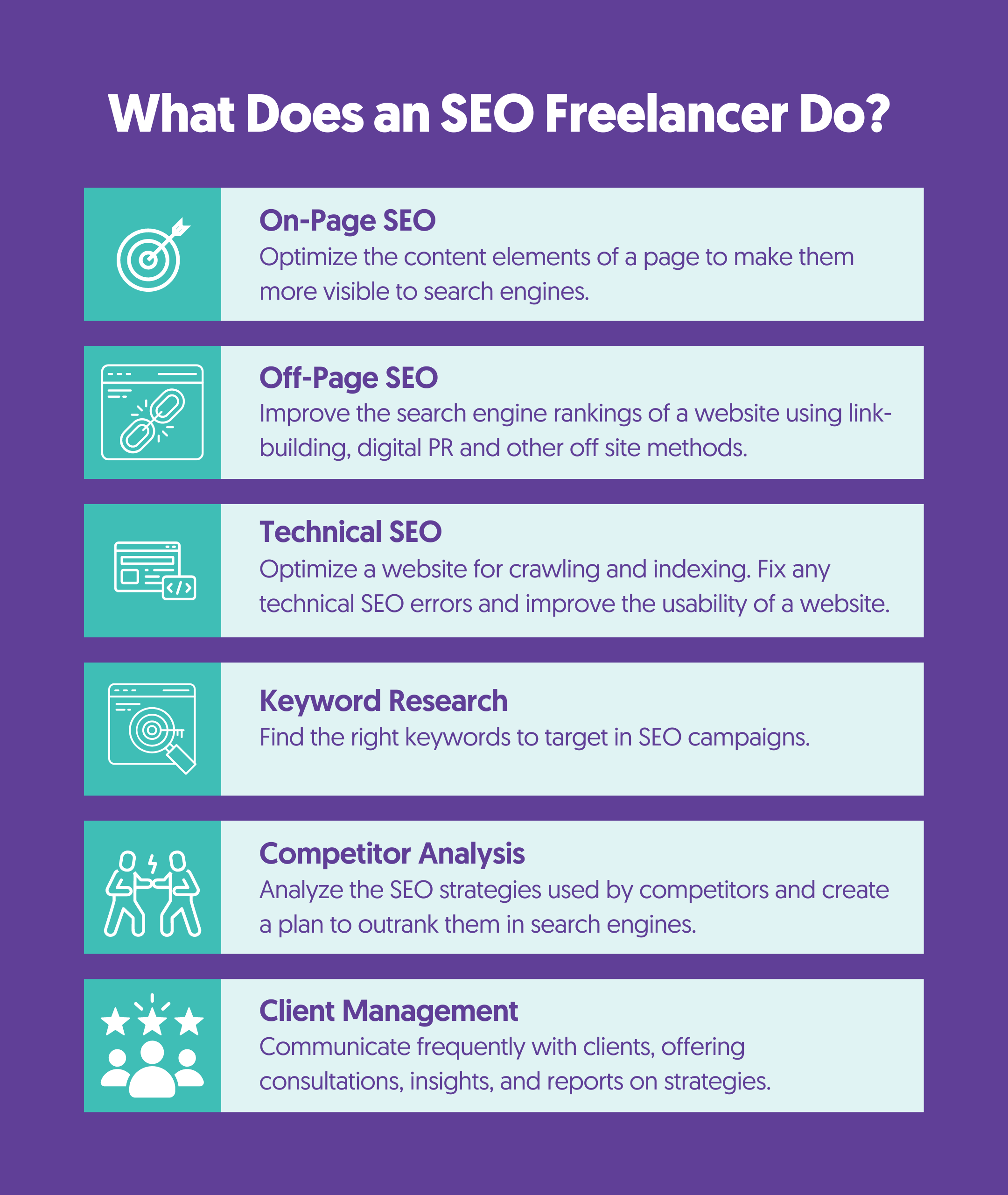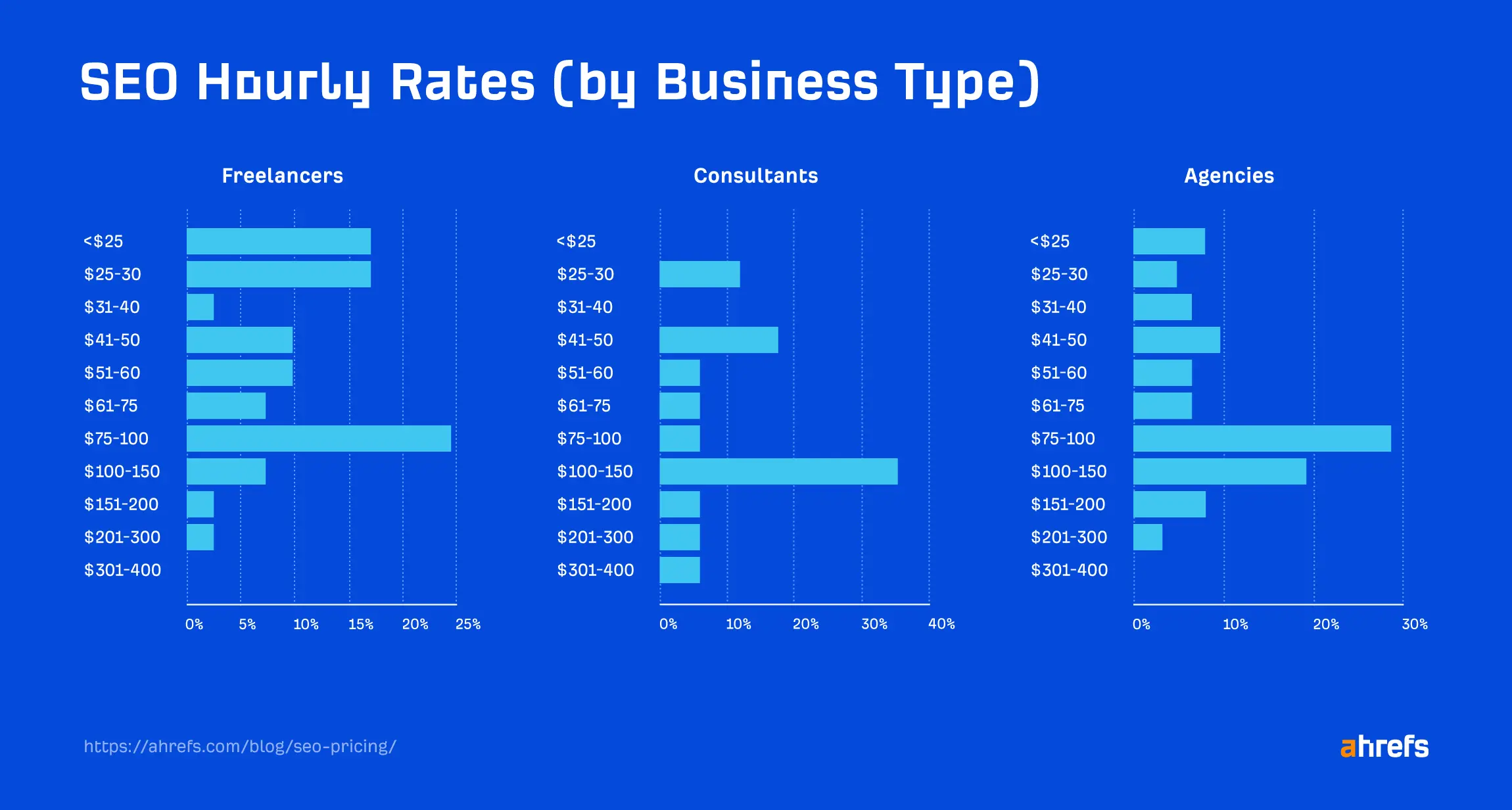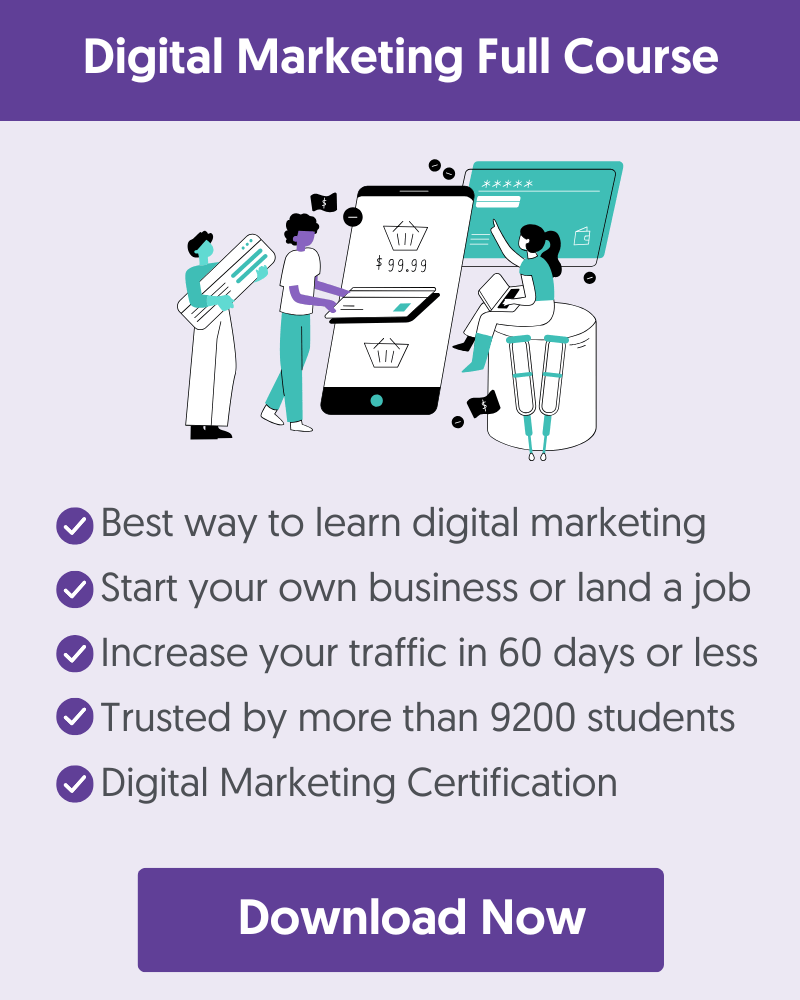Life as an SEO freelancer can offer many unique benefits to those interested in content creation and digital marketing. SEO expertise is among the most valuable and sought-after marketing skills, making freelancers invaluable to established businesses and startups.
While freelancing has a relatively low barrier to entry compared to other career paths, it's still important for SEO professionals to develop the right strategy for their future.
I started my digital marketing career as a freelancer, and in this post, you’ll learn how to become an SEO freelancer capable of attracting and retaining valuable clients.
What is SEO Freelancing?
SEO freelancing involves pursuing client relationships and offering services as a solo SEO/digital marketing entrepreneur.

Rather than working for a specific company or agency, an SEO freelancer runs their own business, connecting with a range of clients worldwide.
The freelancing route ensures professionals can enjoy a more flexible career, with complete control over their pricing strategies, the services they offer, and even the clients they choose to work with.
Increasingly, learning how to become an SEO freelancer is becoming a more popular choice among experts.
Companies are beginning to rely more heavily on freelancers in a problematic economy rather than hiring in-house staff.
In fact, one study found 78% of companies in 2023 said they would be looking for freelancers to assist with their marketing efforts.
SEO Freelancing can provide professionals access to infinite opportunities for career growth and expansion. However, it does require experts to invest in building their own brand, sourcing clients, and cultivating the right skills.
What Does an SEO Freelancer Do?
The responsibilities of an SEO freelancer can vary depending on the type of business they choose to run.
Some freelancers take a more specialist approach with their services, focusing on concepts like technical SEO or keyword research, while others offer a broad range of solutions.
Ultimately, an SEO freelancer aims to organize, create, or edit content to ensure companies can maintain or build a strong presence on search engine results pages.

Some of the core services offered by freelancers include:
On-page SEO: On-page SEO strategies involve optimizing the content of a page to improve its visibility in the search results for specific keywords and terms.
Off-page SEO: SEO freelancers focused on off-page SEO try to improve the search engine rankings of a website using link-building, digital PR, and other off-site SEO techniques.
Technical SEO: Optimize a website for the crawling and indexing phase. Fix any technical SEO errors and improve the usability of a website.
Keyword Research: Many SEO strategies rely heavily on using specific terms and phrases, known as SEO keywords.
Freelancers need to learn what a company's target audience is searching for, then strategically incorporate those terms into content, meta tags, descriptions, and alt tags.
Competitor analysis: SEO freelancers often spend a lot of time on research, analyzing not just market trends and audiences but also competitors.
Competitor analysis can help freelancers find which keywords competitors use, identify where "gaps" exist, and adjust their SEO strategies accordingly.
Client management: As a freelancer in the SEO world, you must be comfortable managing clients.
You may be responsible for working alongside other teams to create and plan projects with timelines and milestones.
You'll need to communicate frequently with clients, offering consultations, insights, and reports on strategies.

How to Become an SEO Freelancer (10 Steps)
Here are the key steps involved in becoming an SEO freelancer.
- Build Advanced SEO Skills
- Start an SEO Blog
- Build Your Personal Brand
- Set Your Rates
- Get Your First Clients
- Build a Portfolio
- Collect Reviews From Clients
- Build Your SEO Toolkit
- Hire an Assistant
- Continue To Learn and Grow
1. Build Advanced SEO Skills
The first and most important thing you'll need to succeed as an SEO freelancer is a deep and expert knowledge of search engine optimization.
SEO is a complex and broad marketing concept involving many factors, from link building and keyword research to content creation.
As an SEO freelancer, you'll need to understand how search engine algorithms work and how to leverage different strategies to help your clients reach their goals.
There are various ways to hone your skills, such as:
Taking SEO courses: There are numerous SEO courses, programs, and workshops for digital marketers today.
Many free SEO courses don't require prior knowledge and teach SEO basics, content optimization, and strategy development.
Earn SEO certifications: Earning an SEO certification is an excellent way to improve your skills and knowledge of the landscape and attract a wider range of clients.
Reputable certifications can boost your credibility in your industry and make connecting with a host of potential customers easier.
Reading SEO books and guides: Books and SEO guides offer excellent behind-the-scenes insight into some of the core components of SEO.
You can use these resources to discover the differences between on-page, off-page, and technical SEO. Plus, many guides come with tips and tricks you can use in your own marketing strategies.
Learn from industry experts: Thought leaders in the SEO landscape regularly share advice through blog posts, articles, and even social media posts.
You can also find useful TED talks and videos from credible professionals, which can help you learn more about the industry and the techniques you can use.
Read the guides below for more information on building SEO skills.
2. Start an SEO Blog
While reading about SEO skills and techniques and learning from courses is a great way to expand your knowledge, putting the methodologies you discover into practice is crucial too.
Creating a website or blog where you can practice your SEO skills can boost your chances of connecting with clients by drawing attention to your professional brand.
With your SEO blog, you can focus on specific topics, looking at search terms that will attract possible clients, such as "How to perform an SEO audit" or "How to hire an SEO freelancer."

This strategy will not only help you test your skills and practice different techniques, but it will also demonstrate your value to potential clients.
If you can show customers that you've been able to get your own website or blog to the top of the search engine results pages for your chosen keywords, they're more likely to trust your skills.
You can even use your content to position yourself as a thought leader in your industry.
3. Build Your Personal Brand
Your personal brand is crucial to your success as an SEO freelancer. It's how you'll differentiate yourself from other service providers in your space, earn the trust of your potential clients, and boost your earning potential through brand equity.
A blog or website is an excellent way to start building your personal brand, as it offers potential customers insight into your skills, personality, and work ethic.

However, it's also worth expanding your brand whenever you can. Consider creating accounts on popular social media platforms where your customers might be looking for SEO support.
In the B2B world, channels like LinkedIn, Twitter, and Facebook are excellent for capturing customers' attention and enhancing your credibility.
These channels will also allow you to develop your brand network by joining groups of digital marketing professionals, interacting with thought leaders, and nurturing new relationships.
Ensure every platform you use to enhance your online presence showcases a consistent brand identity. Use the same tone of voice, language, and logos in your content to build a sense of familiarity with your target audience.
4. Set Your Rates
Choosing the proper pricing for your services as an SEO freelancer can be one of the most complicated parts of starting your own business.
There are various ways to price your services. You can set rates on an hourly or per-project basis or offer clients monthly retainers. Retainers are ideal for ensuring a consistent long-term income.
When setting your rates, assessing the industry and market standards is important.

For instance, one-off SEO projects are usually charged between $2,500 and $5,000.
Hourly services often cost between $75 and $100 per hour, while retainers can be offered at around $500 to $1,500 per month.
Ideally, your pricing structure should ensure you can compete with other service providers in your space while still delivering a good profit.
Before you offer a price, carefully consider the amount of work that will go into each project or SEO strategy for a client.
It's also worth remembering that pricing structures for SEO services can vary depending on where you are in the world.
For instance, European hourly rates usually fall between $75 and $100, while in the US, they range from $75 to $150.
5. Get Your First Clients
Once you've set your rates and started developing your personal brand, the next step is finding your first clients.
The focus should be building your reputation as a reputable SEO expert. The more experience you get in the industry, the more you can share endorsements, reviews, case studies, and portfolio pieces with future clients.
When you're first building a name for yourself, you may need to consider applying for lower-paying projects or offering free services.
You can explore options on freelance channels like Upwork, Fiverr, and other websites. You could consider searching through platforms like LinkedIn for companies that are in search of SEO support.
You might even work on websites for non-profits and friends for free.
Promote your services as often as possible to boost your access to new clients. You could combine SEO with PPC advertising to boost your visibility or use social media to connect with targeted customers.
Attending industry events can also be a great way to expand your network and discover new potential clients.
Read the guide below for more information on how to get clients for your freelance business.
6. Build a Portfolio
A portfolio is a great way to draw attention to your achievements and projects over the years.
The ideal SEO portfolio should give potential clients all the information they need to determine whether you're the right expert for their needs.
It should include your name and contact information, as well as insights into previous projects in the form of case studies. You can also use your portfolio to highlight positive reviews and endorsements from other companies.

The more valuable data you can include in your portfolio, the more compelling you'll become to potential clients. You might include insights into:
- Your most popular and highest-ranking pages or blog posts
- Link-building examples
- Website performance statistics
- Case studies about how you've helped clients overcome SEO challenges
Your portfolio should give clients a solid sense of the type of SEO work you specialize in and the results you can deliver for their projects.
7. Collect Reviews From Clients
Part of developing a strong professional brand and portfolio as an SEO freelancer is cultivating plenty of social proof.
The best SEO freelancers earn clients thanks to significant word-of-mouth referrals and excellent credibility.
The more positive reviews you can add to your website or social media pages, the more likely you are to earn the trust of potential customers.
The best way to start collecting reviews for your freelance business is to speak to your previous clients. Ask your customers to leave reviews for your services on channels like Google, Facebook, LinkedIn, and your own website.
Request access to publish their information on your portfolio or encourage people to "endorse" you on your LinkedIn profile.
If you're struggling to earn reviews, offering customers an incentive for their time, such as a discount on their next service, is often helpful.
You can also provide your customers with templates or guidance they can use when leaving reviews to make it easier for them to endorse your brand.
8. Build your SEO Toolkit
As your freelance SEO business and client base grow, you'll need to learn how to utilize valuable tools in your work to streamline and enhance your processes.
There are various powerful tools out there that can support you in your projects, from software designed for keyword research to website analytical tools.
While the exact resources you'll rely on may vary depending on the kind of SEO services you offer, some popular options include:
- Semrush: An all-in-one digital marketing platform with keyword and competitor research tools, pay-per-click marketing, and social media advertising. This tool makes optimizing your campaigns and creating data-driven SEO strategies easy.
- Google Search Console: One of the most valuable SEO tools in the market today, Google Search Console is an easy-to-use platform for monitoring and reporting on a website's Google performance.
- Google Looker Studio: Ideal for producing useful reports highlighting the value of your services, Google Looker Studio is a tool that allows you to transform raw data into graphs and charts. Combining data from Google Search Console and Google Analytics allows you to create branded, insightful reports for any client in minutes.
- Google Analytics: The ultimate analytical tool for SEO freelancers, Google Analytics helps you to track your SEO ROI with insights into website traffic and other crucial KPIs. It’s an easy-to-use platform that is ideal for measuring the performance of all digital marketing campaigns.
- Google Docs and Sheets: Google Docs and Google Sheets are handy, simple tools, great for client communication. They allow you to transfer information back and forth between yourself and your client using the cloud.
9. Hire an Assistant
While many SEO freelancers start their professional careers as solo entrepreneurs, you may need additional help and support as your business evolves.

As you continue earning new projects and clients, you may not have enough time to focus on customer communication, schedule management, and SEO strategies simultaneously.
Hiring an assistant is a great way to make your business more efficient. A virtual assistant (VA) can handle tasks like sending emails, conducting market research, and setting up meetings so that you can focus on the more complex parts of search engine optimization.
Assistants are great for scaling your business and ensuring you have enough time to work with various clients.
10. Continue To Learn and Grow
Finally, if you're planning on pursuing a lucrative career as an SEO freelancer, it's important to remember that you'll need to commit to long-term growth and education.
The SEO industry constantly evolves, with new strategies and methodologies always emerging.
You'll need to stay updated with industry and algorithm changes by reading the latest SEO news, taking courses, and watching videos.
It's also worth paying close attention to the performance of your SEO strategies over time to better understand which methodologies work best for you.
Your SEO blog is an excellent place to experiment with new strategies and theories, so it's a good idea to focus on growing and using this resource over time.
How Much Does Freelance SEO Make?
Building your authority as an SEO freelancer and earning clients requires a lot of work. However, the SEO landscape can offer lucrative career opportunities to the right marketers.
As mentioned above, the amount you can earn as an SEO freelancer will depend on numerous factors, from your location to your level of expertise.
If you choose to charge customers hourly, the most popular rate is $75- $100 per hour, meaning you can earn up to $4000 a week with a 40-hour schedule.
The more experience you gain, the more you'll be able to charge. For instance, freelancers with more than 10 years of experience in the SEO field earn an average of $118.35 per hour.
You can also increase your income by offering services worldwide and working with a range of clients on monthly retainers and one-off projects.
Around 78.2% of freelancers charge a monthly retainer for some or all of their work. Monthly fees often range from $500 to $1000, and the costs can vary depending on the services offered.
Depending on the scope and size, charging per project for SEO services can be lucrative, too. Most freelancers charge around $2000 or less for a single project, such as an SEO Audit.
Is SEO a Good Career For Freelancing?
Becoming an SEO freelancer could be an excellent choice for various marketing professionals.
If you use the steps above to develop a name for yourself in your industry, you can earn a significant income as a freelancer, and unlock endless opportunities to work with all kinds of brands and companies.
Because much of SEO work relies on digital tools, there's no need to attend an office in person to stay productive in this field. Additionally, demand for SEO freelancers is growing as companies search for more budget-friendly ways to optimize their marketing.
If you're interested in a flexible, versatile career path that gives you complete control over your earnings, the services you offer, and the clients you work with, SEO freelancing could be the perfect option for you.
Continue your learning with these resources.




